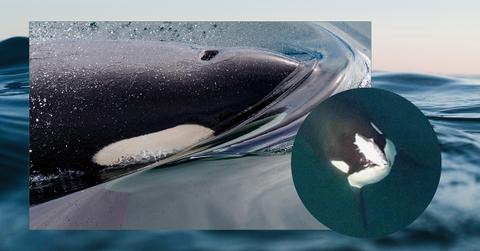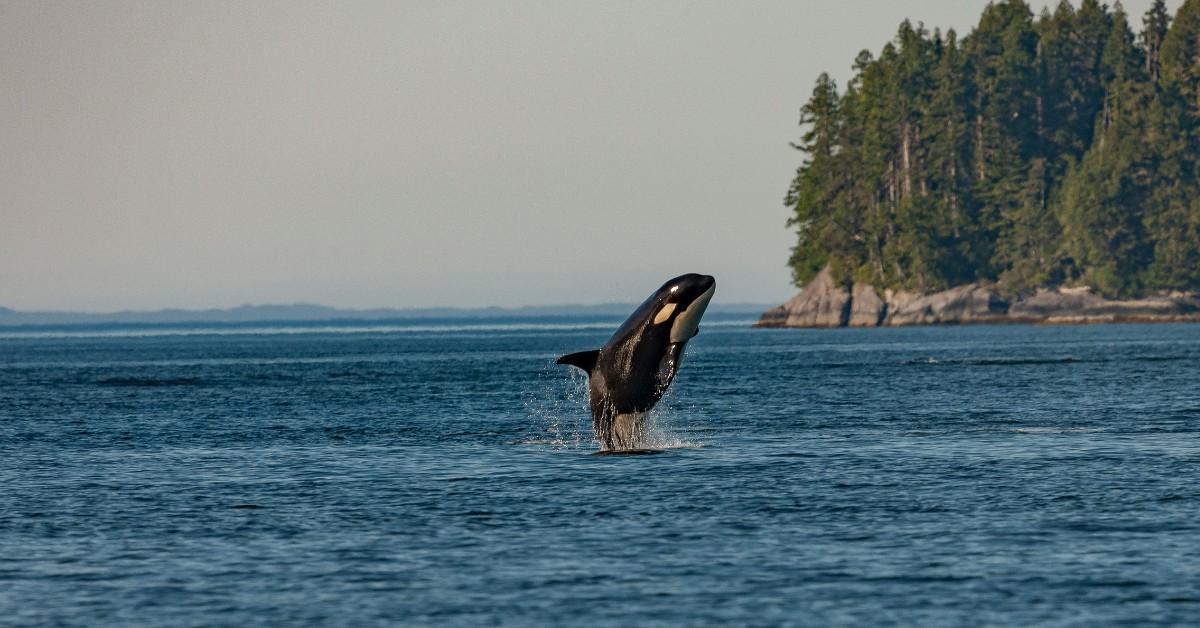Orcas Bring Back Fashion Trend From Decades Ago: Salmon Hats
Experts believe orcas are just as susceptible to changing fashion trends as humans are.
Published Dec. 2 2024, 2:22 p.m. ET

A pod of orcas in the Pacific Northwest are currently in the running for "best dressed" after being spotted with a surprising fashion accessory.
The shocking — and one would have to imagine smelly — fashion trend involves salmon, specifically, orcas wearing dead salmon on their heads as a sort of hat.
Experts have no idea why a group of orcas are wearing dead salmon as hats, but they do know that it's a trend that used to be popular with another generation of whales from the 1980s.
Is orca fashion as cyclical as human fashion? Or are some fads just so great that they resurface every few years? Find out what the pros think about these salmon-wearing killer whales below.

Why do orcas wear salmon as hats?
Researchers aren't exactly sure why the fish hat trend has reared its head again (pun intended) but they think it may have something to do with the fashion in 1987, when a female orca was seen wearing a salmon hat while swimming off the coast of Puget Sound.
What seemed like a bizarre choice at first quickly became popular among the rest of the whales in the pod, according to the LiveScience blog, and the rest of the orcas eventually jumped on the trend.
ORCA, the marine conservation charity, noted that the fad had a short lifespan, and by the end of the year, the salmon hats were forgotten.
So, what has some whales pulling the same moves as their grandparents in 2024? According to researchers, it may be a case of a good memory. Scientists believe that the modern-day creatures may be part of that original pod from 40 years ago and may even include some of that first group to don the headpiece.
As for the timing of the trend, researchers also think it may be a sign that salmon is once again plentiful in the waters of the Puget Sound. Experts told NewScientist that the whales may be treating their heads much like a doggy bag, tucking away some extra salmon to snack on later.
They have good reason for thinking they've cracked the purpose of the trend since orcas have been known to save their leftovers in other spots on their body as well.
"We've seen mammal-eating killer whales carry large chunks of food under their pectoral fin, kind of tucked in next to their body," one expert told the outlet, noting that salmon may just be too small to work that way, forcing them to get creative with food storage.
Scientists are hoping to be able to prove their theory soon. They've outfitted some drones with cameras, and plan to follow the orcas around to see if they are eating the salmon or tossing it away when they're done wearing it.
Do orcas only eat Chinook salmon?
What orcas eat has a lot to do with accessibility, according to the Wild Orca website. Those who live in the Pacific Ocean are more likely to eat Chinook (also known as King salmon), per Wild Orca, because they are the biggest and heartiest of all the salmon that live in the ocean.
Orcas that live in other areas have more diversified diets, which means they eat a wider variety of foods.
However, Wild Orca warns that orcas surviving off of Chinook may find themselves in precarious positions should the salmon populations continue to decline since the whales in those waters don't know how to hunt anything else.
When you consider how many generations it takes for a new skill to be learned, perfected, and passed down to future generations, these orcas may not have enough time to pivot to a new breed of fish before generations start starving to death.
It makes more sense as to why orcas would want to keep extra salmon around — even if it does means turning them into a funny looking hat.